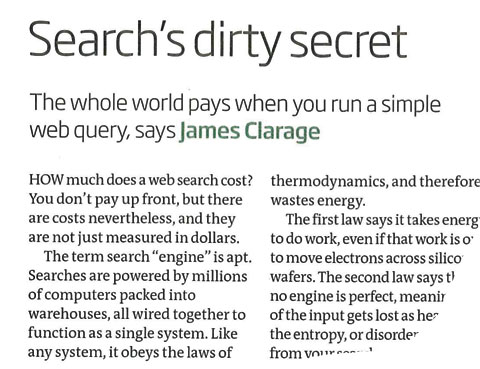Last week’s opinion page of New Scientist magazine featured an article by an American physicist, describing the huge energy costs of a simple Google search query.
It hardly takes a second to type in a word in Google and hit the ‘search’ button. And while this may seem a trivial act for most people, it most assuredly is not. During that second you consume a huge amount of energy: the equivalent of a 100-watt light bulb burning for one hour, or so James Clarage, a physicist at the University of St Thomas in Houston, has calculated.
Clarage reasons that Google’s data centres contain nearly a million servers, each using approximately one kilowatt of electricity (mostly for cooling). So every hour Google’s engine burns through one million kilowatt-hours. Since Google serves up approximately ten million search results per hour, this means that one search has the same energy cost as turning on a 100-watt light bulb for an hour.
Following the article on the website is a long list of comments from readers, mostly mocking the statistics and calculations. Clarage’s figures for the number of searches that Google performs were based on information deriving from a consultancy company called Comscore, which specializes in IT. Some critical readers remarked that Google processes almost ten times more searches (their figures are backed up by yet another consultancy firm) and that Google’s servers each use four times less electricity than Clarage states.
According to TU Delft professor, Henk Sips, of the parallel and distributed systems section (Electrical Engineering, Mathematics and Computer Science), it is very difficult to calculate exactly how much energy a Google search costs. The 100-watt light bulb comparison does not seem far fetched to him, however. “But”, he adds, “it could easily be wrong by a factor of two. These kinds of calculations are always made on the back of a napkin, because nobody is given access to data about how Google actually functions.”
Prof. Sip says that a certain degree of nuance is required. He points out that the hard disks on Google’s servers are also used for its Gmail email service, meaning the 100-watt theory cannot only be accounted for by net searches. “And”, the professor continues, “an increase in the number of searches won’t lead to a linear increase in energy consumption. The servers are continuously indexing websites around the world. They are doing the preparative work, so to say, so that when you type in a query, Google can immediately give you the results.” While they are busy indexing, the servers heat up and then must be cooled.
But like Clarage, Prof. Sips also believes that Google’s energy consumption will rise. But whereas the former warns about what will happen when six billion people on Earth have access to internet, Sips is primarily concerned about the effects of video streaming: “Youtube is an energy devourer. In our field of work, we are left wondering how long Google can continue with this service. According to most analysts, the company is losing money with Youtube, but then again, all that comes through the grapevine.”
Another influential factor in the future energy consumption of Google queries is the use of optical fibre in internet networks, which is rising. Sending information through optical fibre costs a lot less energy than through copper cables.
Het college keurde alvast een investering van twee miljoen euro goed. Daadwerkelijke plannen zijn nog niet bekend.
Daarom besloot de raad te kijken hoe de Erasmus Universiteit Rotterdam (EUR) het aanpakt. Expert mobiliteitsmanagement en parkeerbeleid van die universiteit, Giuliano Mingardo, hield hierover donderdag 25 juni een openbare lezing.
De Rotterdamse universiteit onderzocht twee jaar geleden met welk vervoermiddel medewerkers naar campus Woudestein komen. Met 43 procent autorijders – die een gratis parkeerkaart kregen – doet de EUR het heel goed. Landelijk ligt dat percentage op 60 tot 70 procent. Een kwart pakt het openbaar vervoer en nog iets meer de fiets.
Door nieuwbouw op de Delftse campus is er in 2028 een parkeergarage nodig die veertig miljoen euro kost. Betaald parkeren is noodzakelijk, maar als je een vriendelijk tarief rekent, subsidieer je volgens Mingardo in feite auto’s.
Veertig miljoen euro gedeeld door tweeduizend medewerkers is twintigduizend euro per medewerker. Daar moet een slimmere oplossing voor te bedenken zijn, waardoor misschien niet meer zo’n grote parkeergarage nodig is.
De EUR hing beeldschermen op de universiteit die vertrektijden van het openbaar vervoer aangeven. Ook kwam er een project e-fietsen, fietsen met elektrische ondersteuning. Daardoor rijd je 25 in plaats van 15 kilometer per uur en kun je ook als je iets verder weg woont, toch met de fiets komen. Kosten: tweeduizend euro per fiets. Voor veertig miljoen euro kunnen heel wat fietsen per medewerker worden gekocht en zijn minder parkeerplaatsen nodig.
Toch ontkomt de EUR niet aan betaald parkeren voor medewerkers, want gratis parkeren bestaat niet. De supermarkt berekent parkeerkosten immers ook door in producten. Gratis parkeren op de campus leidt op diezelfde wijze tot lagere onderzoeksbudgetten en minder faciliteiten.
Uit parkeeronderzoek bleek dat elf procent van de automobilisten niet meer naar een winkelcentrum kwam als parkeren daar vijf euro per uur kost. Toch was er geen verband tussen parkeertarief en omzet. Conclusie: parkeren is minder belangrijk dan men denkt en er zijn nieuwe projecten te ontwikkelen met minder parkeerplekken.
Moraal van Mingardo’s verhaal: het subsidiëren van mensen is effectiever en goedkoper dan het subsidiëren van parkeerplekken. Denk goed na voordat je miljoenen stopt in een parkeergarage. En: een klein onderzoek in het begin kan later veel tijd en geld besparen.



Comments are closed.